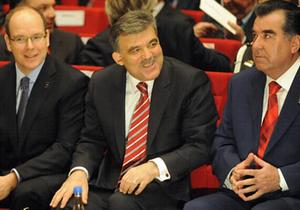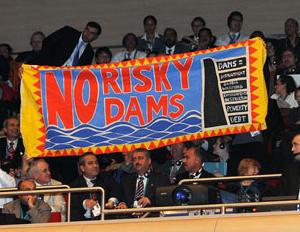World Water Forum Opens to Scarcity Fears and Protests
ISTANBUL, Turkey, March 16, 2009 (ENS)
Global demand for water is greater today than it has ever been and demand will increase in the future, thousands of delegates to the Fifth World Water Forum in Istanbul heard at their opening session today. Driving the demand for water are population growth and mobility, rising living standards, changes in food consumption, and increased energy production by hydropower and biofuels finds a new assessment of the planet’s freshwater resources by 26 United Nations agencies.
"With increasing shortages, good governance is more than ever essential for water management. Combating poverty also depends on our ability to invest in this resource," said the Director-General of UNESCO Koïchiro Matsuura, who presented the report to the Forum on behalf of the United Nations.
The report finds that corruption in the water sector may account for a rise of almost US$50 billion in the cost of achieving the Millennium Development Goals on water and sanitation. These eight goals, to be accomplished by 2015, were agreed in 2000 by all the world’s countries and major development institutions.
Typical examples of corruption include falsified meter readings, favoritism in public equipment purchases, and nepotism in the allocation of public contracts. The report estimates that 30 percent of budgets can be siphoned off in some countries.
Yet these corrupt practices are rarely curbed, despite initiatives by some countries. Donors and investors have not been blind to this fact, and most developmental aid agencies have chosen to focus on countries with good anti-corruption records.
 |
From left, Albert II, Prince of Monaco; Abdullah Gül, President of the Republic of Turkey; and Emomali Rakhmon, President of Tajikistan. (Photo courtesy Earth Negotiations Bulletin) |
One of the six themes of the World Water Forum, governance and management, will address ways to limit corruption.
In his opening remarks, World Water Forum Secretary General Oktay Tabasaran stressed that the Forum's goal is to urgently address the issue of efficient water use.
Turkish President Abdullah Gul told delegates that water issues require attention at the highest levels of government.
With more than 28,000 participants in attendance, more than 100 thematic sessions are scheduled on topics such as global change and risk management; advancing human development and the Millennium Development Goals; managing and protecting water resources; finance; and education, knowledge and capacity development.
The world is on track to meet the drinking water target of the Millennium Development Goals, apart from Sub-Saharan Africa, which is lagging behind with about 340 million people lacking access to safe drinking water.
But the world is far from achieving the sanitation target. Half a billion people lack access to adequate sanitation in Africa alone and many other regions are also trailing. Current efforts will need to be doubled if we are to achieve the goals set by the United Nations, the report shows.
The link between poverty and water resources is clear - the number of people living on less than US$1.25 a day is roughly equal to the number of people without access to safe drinking water.
This situation has a major impact on health. Almost 80 percent of diseases in developing countries are associated with water, causing some three million early deaths. At least, 5,000 children die every day from diarrhea - one every 17 seconds. About one-tenth of all illnesses worldwide could be avoided by improving water supply, sanitation, hygiene and management of water resources, the report shows.
Meanwhile, energy demand is accelerating, and with it, water demand. Global energy demands are expected to grow by as much as 55 percent through 2030. China and India alone would account for about 45 percent of this increase.
Electricity generation from hydropower is projected to increase at an average annual rate of 1.7 percent from 2004 to 2030 – an overall increase of 60 percent.
Criticized for their heavy footprint on the environment and their tendency to displace large numbers of people, dams still appear to offer a solution, given diminishing fossil fuel supplies, the need to shift to cleaner energy sources and the potential use of added storage in adapting to the increased hydrologic variability and uncertainty due to climate change.
Many new dams are planned for developing countries, where the potential for hydropower is considerable.
The conflict over dams erupted today at the World Water Forum opening ceremony.
 |
International Rivers protesters hold their banner up at the World Water Forum opening ceremony. (Photo courtesy ENB) |
Two staff members of the California-based advocacy group International Rivers were arrested and detained for unfurling a banner. They will be deported tomorrow morning or face a year in Turkish prison.
As the opening ceremony began, International Rivers' South Asia Director Ann-Kathrin Schneider and climate campaigner Payal Parekh unfurled a banner reading "No Risky Dams" in protest of what they believe to be the World Water Forum's promotion of destructive dams. They shouted slogans as the chair of the World Water Forum and government dignitaries were about to take the stage.
As she was being detained, Parekh said, "Large dams have left a legacy of lies and loss. Continuing to build destructive dams will bring unacceptable risks to people and the planet."
Schneider said, "The Ilisu Dam in Southeast Turkey is a symbol of outmoded water and energy policies which destroy communities and the environment. We call on the participants of the World Water Forum to embrace smarter and cleaner solutions which are readily available."
While some Forum participants applauded the protest, the police detained the two protestors. Meanwhile, outside the conference center riot police used water cannons and tear gas against 150 protestors who shouted "water for life, not for profit" in opposition to what they view as the World Water Forum's agenda of water privatization and river destruction. Seventeen protestors were arrested.
Peter Bosshard, International Rivers Policy Director, whose opinion piece on the World Water Forum and large dams was published in today's "Turkish Daily News," said "The response by the Turkish authorities highlights the undemocratic nature of the World Water Forum. Two protestors being deported for unfurling a banner is unacceptable. We call on the World Water Council to respect and support the rights of all people to speak freely and protest peacefully."
The World Water Forum takes place every three years. It is organized by the World Water Council, a membership organization that includes the large development banks, associations of professional engineers, academic institutions, some of the largest aid and environmental organizations, United Nations agencies, national and local government agencies, and dam construction companies.
Copyright Environment News Service (ENS) 2009. All rights reserved.
To subscribe or visit go to: http://www.ens-newswire.com